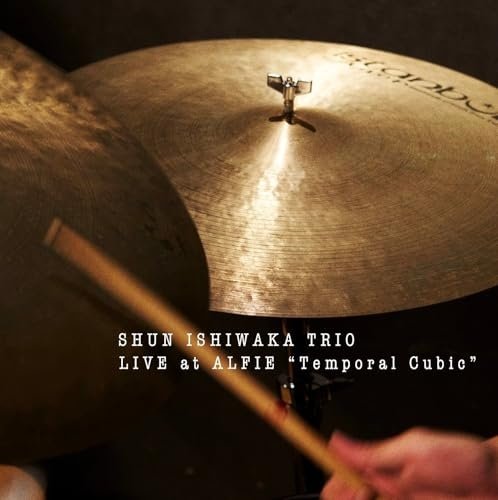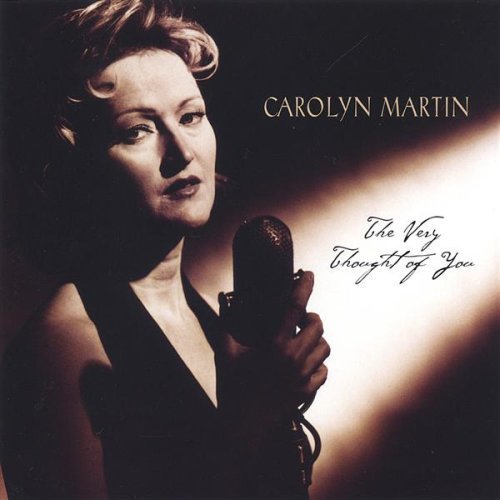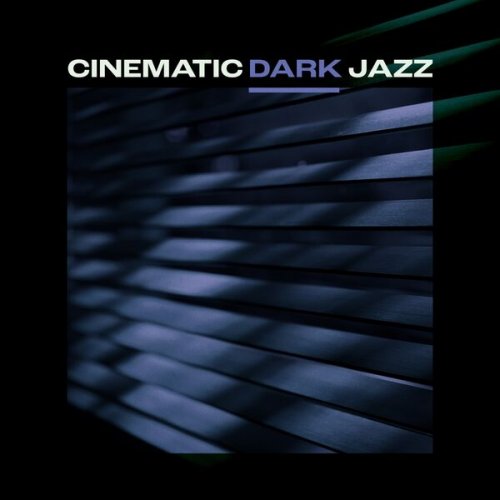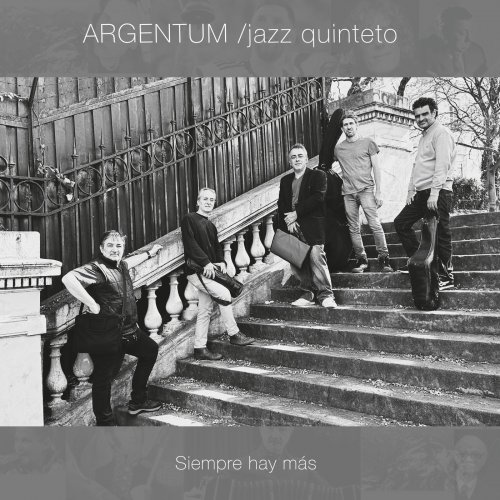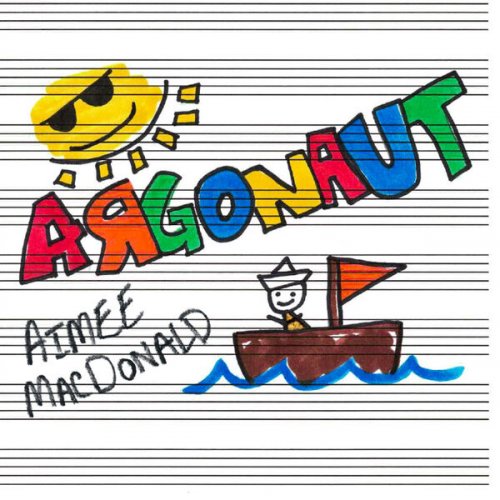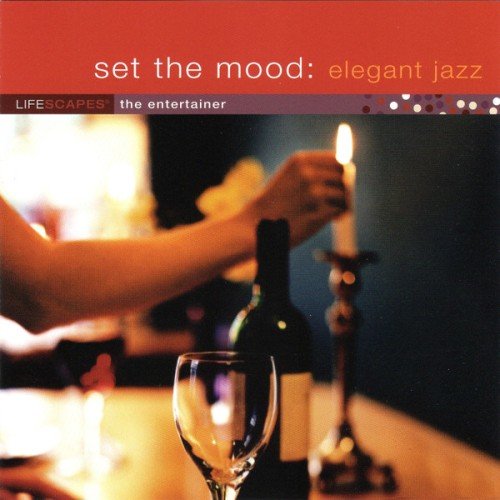Sylvia McNair & Neville Marriner - George Frideric Handel: Messiah (1992)
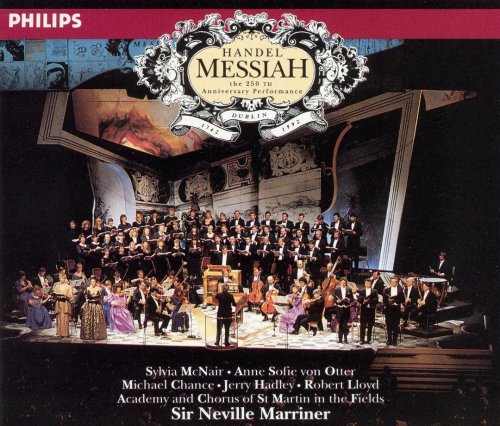
Artist: Sylvia McNair, Sir Neville Marriner, Anne Sofie von Otter, Michael Chance, Jerry Hadley, Robert Lloyd, Academy of St. Martin in the Fields, Academy of St. Martin in the Fields Chorus
Title: George Frideric Handel: Messiah
Year Of Release: 1992
Label: Philips Classics
Genre: Classical
Quality: FLAC (image + .cue, log, scans)
Total Time: 02:11:02
Total Size: 623 MB
WebSite: Album Preview
Tracklist:Title: George Frideric Handel: Messiah
Year Of Release: 1992
Label: Philips Classics
Genre: Classical
Quality: FLAC (image + .cue, log, scans)
Total Time: 02:11:02
Total Size: 623 MB
WebSite: Album Preview
CD 1
Part I
1-1 Symphony 3:03
1-2 No.1 Accompagnato: Comfort Ye, My People (Tenor) 2:36
1-3 No.2 Air: Ev'ry Valley Shall Be Exalted (Tenor) 3:11
1-4 No.3 Chorus: And The Glory Of The Lord 2:51
1-5 No.4 Accompagnato: Thus Saith The Lord (Bass) 1:31
1-6 No.5 Air: But Who May Abide The Day Of His Coming (Alto) 4:21
1-7 No.6 Chorus: And He Shall Purifiy The Sons Of Levi 2:22
1-8 No.7 Recitative: Behold, A Virgin Shall Conceive (Mezzo-soprano) 0:27
1-9 Nos.8-9 Air And Chorus: O Thou That Tellest Good Tidings (Mezzo-soprano, Chorus) 5:13
1-10 No.10 Accompagnato: For Behold, Darkness Shall Cover The Earth (Bass) 3:20
1-11 No.11 Air: The People That Walked In Darkness (Bass) 2:27
1-12 No.12 Chorus: For Unto Us A Child Is Born 3:48
1-13 No.13 Pifa: Pastoral Symphony 1:08
1-14 No.14 Recitative: There Were Shepherds (Soprano) / Accompagnato: And Lo, The Angel Of The Lord (Soprano) / Recitative: And The Angel Said Unto Them (Soprano) / Accompagnato: And Suddenly There Was With The Angel (Soprano) 1:40
1-15 No.15 Chorus: Glory To God In The Highest 1:43
1-16 No.16 Air: Rejoice Greatly, O Daughter Of Zion (Soprano) 4:30
1-17 No.17a Recitative: Then Shall The Eyes Of The Blind (Mezzo-soprano) 0:28
1-18 No.18a Duet: He Shall Feed His Flock (Mezzo-soprano, Soprano) 5:05
1-19 No.19 Chorus: His Yoke Is Easy 2:08
Part II
1-20 No.20 Chorus: Behold The Lamb Of God 2:30
1-21 No.21 Air: He Was Despised (Mezzo-soprano) 9:26
1-22 No.22 Chorus: Surely He Hath Borne Our Griefs 1:53
1-23 No.23 Chorus: And Wit His Stripes We Are Healed 1:36
1-24 No.24 Chorus: All We Like Sheep 3:02
CD 2
2-1 No.25 Accompagnato: All They That See Him (Tenor) 0:42
2-2 No.26 Chorus: He Trusted In God 2:02
2-3 No.27 Accompagnato: Thy Rebuke Hath Broken His Heart (Tenor) 1:34
2-4 No.28 Arioso: Behold And See (Tenor) 1:17
2-5 No.29 Accompagnato: He Was Cut Off (Soprano) 0:24
2-6 No.20 Aria: But Thou Didst Not Leave (Soprano) 1:56
2-7 No.31 Chorus: Lift Up Your Heads 2:52
2-8 No.32 Recitative: Unto Which Of The Angels (Tenor) 0:17
2-9 No.33 Chorus: Let All The Angels Of God 1:21
2-10 No.34a Air: Thou Art Gone Up On High (Alto) 3:11
2-11 No.35 Chorus: The Lord Gave The Word 1:07
2-12 No.36 Air: How Beautiful Are The Feet (Soprano) 2:21
2-13 No.37a Arioso: Their Sound Is Gone Out (Tenor) 0:58
2-14 No.38 Air: Why Do The Nations (Bass) 2:52
2-15 No.39 Chorus: Let Us Break The Bonds Asunder 1:47
2-16 No.40 Recitative: He That Dwelleth In Heaven (Tenor) 0:14
2-17 No.41 Air: Thou Shalt Break Them (Tenor) 1:58
2-18 No.42 Chorus: Hallelujah 3:37
Part III
2-19 No.43 Air: I Know That My Redeemer Liveth (Soprano) 5:21
2-20 No.44 Chorus: Since By Man Came Death 1:52
2-21 No.45 Accompagnato: Behold, I Tell You A Mystery (Bass) 0:31
2-22 No.46 Air: The Trumpet Shall Sound (Bass) 8:29
2-23 No.47 Recitative: Then Shall Be Brought The Pass (Alto) 0:18
2-24 No.48 Duet: O Death, Where Is Thy Sting? (Alto, Tenor) 1:09
2-25 No.49 Chorus: But Thanks Be To God 2:00
2-26 No.50 Air: If God Be For Us (Alto) 4:10
2-27 No.51 Chorus: Worthy Is The Lamb / Blessing And Honour 2:42
2-28 Amen 3:25
The last quarter of the 20th century witnessed a surge of interest in early music and historically informed performances, and one of the Baroque masterpieces that benefitted the most was George Frederick Handel's Messiah, which virtually everyone involved with the movement for authentic period practice reinterpreted and recorded. Neville Marriner and his Academy of St. Martin-in-the-Fields recorded this engaging version of the popular oratorio in 1992 to commemorate the 250th anniversary of Handel's Dublin premiere, and the live performance is notable for its small orchestra and lean chorus, as well as for its revitalized rhythms, crisp sonorities, and spontaneous ornamentation. A streamlined Messiah is closer to Handel's original intentions than the gigantic post-Romantic versions presented by large choral societies and conventional symphony orchestras. Yet because Handel constantly made changes to Messiah and adapted it to changing ensembles and the needs of available vocal soloists, there is no established, final text that can be given an accurate Baroque performance. Marriner's clarification of lines and textures and his scholarly approach put his performance in the authenticist category, even though the Academy plays modern instruments and is not technically a period orchestra. To that end, Marriner's rendition is as close as many groups' performances, and despite the lack of Baroque instrumentation, it still convinces. The soloists are excellent in their embellishment of their arias, and their expressions are reassuringly familiar, though the standout is Anne Sofie von Otter, whose affecting singing is a highlight of this recording. -- Blair Sanderson
